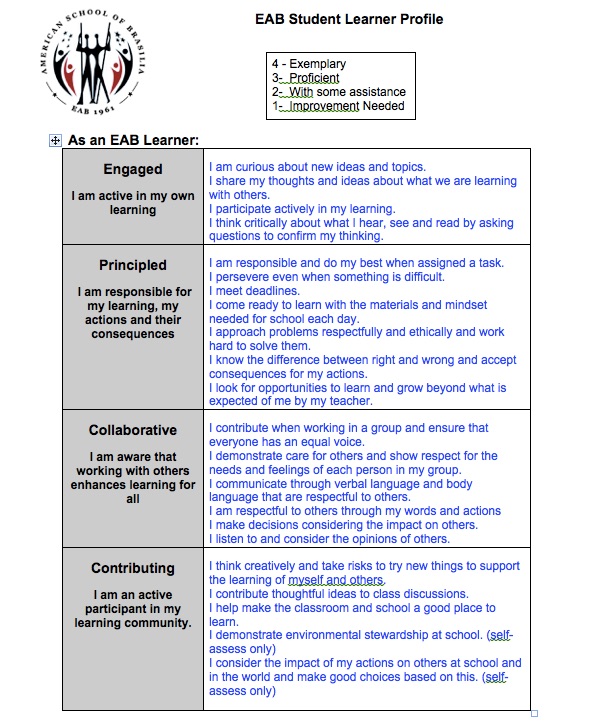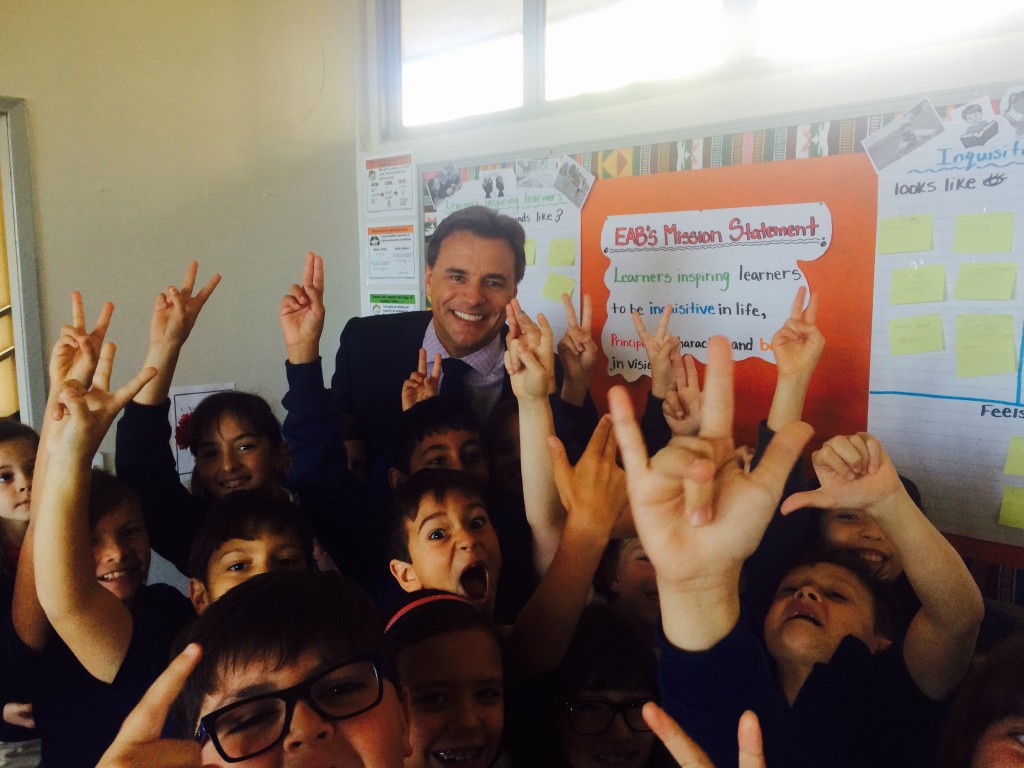Darkness cannot drive out darkness; only light can do that. Hate cannot drive out hate; only love can do that. ~ Martin Luther King, Jr.
International news reports in recent weeks and months have been filled with disturbing reports of terror attacks, refugee migration, acts of aggression, and indescribable loss and suffering. Our hearts go out to everyone who has been affected by these horrific acts and circumstances.
As we are reminded daily of the conflict, hate, and desperation that can exist in the world, we are compelled to reflect on the role international schools play, especially with a focus on the education of future generations.
There are clearly no simple answers to what seem to be infinitely complex global challenges. While it is not the explicit mission of schools to solve these problems, it is the responsibility of schools to work in partnership with families to prepare students with the necessary skills and dispositions to make a positive difference in our communities and the lives of others. Taking this belief a step further, there is a moral imperative for international schools to lead by example and provide students with opportunities to learn how to lead and solve complex problems. We know there is no quick fix to our problems and that solutions of a profound nature will require a long-term strategy guided by a strong moral compass. It is hoped that schools can contribute in meaningful ways to this strategy through relevant and profound learning opportunities.
EAB Mission Statement: Learners inspiring learners to be inquisitive in life, principled in character, and bold in vision.
The Model United Nations (MUN) program is one example of how schools support students towards realizing these ideals. Last weekend, EAB hosted the first ever Brasilia MUN conference with 150 students in attendance. In modeling similar issues faced by the United Nations, students are responsible for proposing and negotiating solutions to some of the world’s most challenging problems. The performance of the students was impressive, not only based on their knowledge of world affairs, but also based on their ability to effectively negotiate effective, creative, and innovative solutions. The following video and photo links highlight some of the extraordinary work of our students: Video, Photos, Website.
EAB Vision Statement: To positively impact the world through excellence in academics, activities, arts, leadership, and service.
EAB’s mission and vision statements provide our community with an important framework in terms of the ongoing development of our educational program. To be “inquisitive in life” emphasizes the focus on learning about the world around us, which includes developing high degrees of empathy and understanding about what is both familiar and different. To be “principled in character” challenges us to by guided by a moral direction. To be “bold in vision” is to commit to making a positive difference in our community and the lives of others.
In a letter reflecting on the Paris attacks, Kevin Ruth, the Executive Director of ECIS, underscored one of the key roles of international schools, which also corresponds to the essence of EAB’s “bold in vision” ideal:
“An absolute cornerstone of any school that calls itself an international school should be the social impact that that school can effect, beginning in its immediate surroundings, yet going beyond, to create positive impact in our world. At times like these, we must go beyond our curricula, beyond our politicking, beyond our first world complaints, and seek to create positive impact in our world as deeply and intentionally as we can.”
Through an educational program that includes experiential learning opportunities such as MUN, it is one of EAB’s fundamental goals to “seek to create positive impact in our world” based on a whole child, community-based educational approach. It is with this vision and commitment that we look to the future with optimism and a belief in a better tomorrow for all.
A escuridão não pode expulsar a escuridão; apenas a luz pode fazer isso. O ódio não pode expulsar ódio; só o amor pode fazer isso. ~ Martin Luther King, Jr.
As notícias internacionais nas últimas semanas e meses foram preenchidas com relatos perturbadores de ataques terroristas, a migração de refugiados, atos de agressão, perdas e sofrimentos indescritíveis. Nossos corações estão com todos aqueles que foram afetados por esses atos e circunstâncias.
Ao sermos lembrados diariamente dos conflitos, ódio e desespero que podem existir no mundo, somos obrigados a refletir sobre o papel que as escolas internacionais desempenham, especialmente sobre a educação das gerações futuras.
Evidentemente, não há respostas simples para o que parecem ser os mais complexos desafios globais. Mesmo a solução desses problemas não sendo a missão explicita das escolas, é nossa responsabilidade trabalhar em parceria com as famílias, para prepararmos os alunos com as habilidades e disposições necessárias para fazerem uma diferença positiva na nossa comunidade e na vida dos demais. Ao levarmos esse pensamento à diante, existe uma exigência moral das escolas internacionais para darem o exemplo e proporcionarem aos alunos, oportunidades para aprender a liderar e resolver problemas complexos. Sabemos que não existe uma solução rápida para os nossos problemas e que as soluções de uma natureza profunda requer uma estratégia em longo prazo, guiada por um forte compasso moral. Esperamos que as escolas possam contribuir de uma forma significativa para essa estratégia, através de oportunidades de ensino profundas e relevantes.
Missão da EAB: Aprendizes inspirando aprendizes a serem questionadores na vida, firmes em seu caráter e com uma visão audaciosa.
O programa do Model United Nations (MUN) é um exemplo de como as escolas podem apoiar os alunos para realizarem esses ideais. No último final de semana, a EAB sediou o primeiro evento do MUN em Brasília, com a participação de 150 alunos. Usando como modelo os problemas enfrentados pelas Nações Unidas, os alunos são responsáveis por propor e negociar soluções para alguns dos problemas mais desafiadores do mundo. O desempenho dos alunos foi impressionante, não apenas com base no seu conhecimento sobre os assuntos mundiais, mas também em sua capacidade de negociar soluções de forma eficaz, criativa e inovadora. O vídeo a seguir e o link das fotos destaca alguns dos trabalhos extraordinários dos nossos alunos: Video, Photos, Website.
Visão da EAB: Impactar o mundo de forma positiva, através da excelência acadêmica, atividades, artes, liderança e serviço.
A Missão e a Visão da EAB fornecem a nossa comunidade uma importante estrutura em termos de desenvolvimento contínuo do nosso programa educacional. Ser “questionador na vida” enfatiza o foco na aprendizagem sobre o mundo que nos rodeia, o que inclui o desenvolvimento de um alto grau de empatia e compreensão sobre o que é familiar e diferente. Ser “firme no caráter” desafia a nos orientar em uma direção moral. Ter “uma visão audaciosa” significa se comprometer a fazer a diferença positiva na nossa comunidade e na vida dos outros.
Em uma carta que reflete sobre os atentados de Paris, Kevin Ruth, o diretor executivo da ECIS, destacou um dos papéis principais de escolas internacionais, o que também corresponde à essência do ideal da EAB “visão audaciosa”:
“O alicerce de qualquer escola que se diz internacional deveria ser o impacto social que essa escola influencia, começando pelo seu ambiente, mas indo além, criando um impacto positivo no nosso mundo. Em tempos como esse, nós temos que ir além do nosso currículo, além da nossa politicagem, além das nossas primeiras queixas sobre o mundo e procurar criarmos um impacto positivo da forma mais profunda e internacional que pudermos.”
Através de um programa educacional que inclui oportunidades de aprendizagem como o MUN, um dos objetivos fundamentais da EAB é “buscar a criação de um impacto positivo em nosso mundo”, com base na abordagem educacional da criança/comunidade por um todo. É com essa visão e comprometimento que nós olhamos para o futuro com otimismo e crença num amanhã melhor para todos nós.











